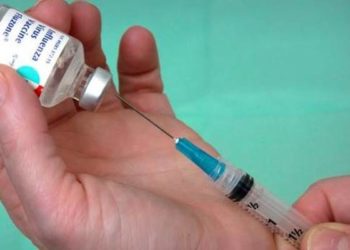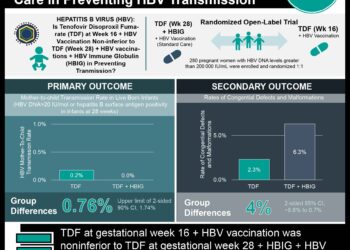Financial incentives improve Hep B vaccination rate among injection drug users
Image: PD
1. Patients undergoing treatment for heroin addiction who received small financial incentives (maximum £30 of supermarket vouchers) were at least 12 times more likely to complete a course of hepatitis B virus (HBV) vaccination than those who received no incentive.
2. At least 80% of participants receiving financial incentives attended appointments on time, ensuring a more efficient use of clinic resources, which may translate into cost-effective practice.
Evidence Rating Level: 1 (Excellent)
Study Rundown: High rates of adherence to treatment maximize public health benefits from health interventions. Injecting drug users are at an increased risk for HBV infection and transmission, but adherence to vaccination schedules is poor. This study assessed the effect of providing a small financial incentive (£30 vouchers) to injection drug users completing HBV vaccination. Financial incentive significantly improved adherence to vaccination programs, supporting the implementation of financial incentives in this setting as well as other areas that could potentially benefit from improved appointment adherence such as early antenatal care or tuberculosis testing. Participants were largely representative of patients in opioid substitution programs in the UK, supporting translatability of these findings if this program is scaled-up. Though this study was limited by clinician adherence to some aspects of the intervention (such as failure to explain the schedule and checking understanding of participants) the incentive was correctly given in 96% of appointments.
The study was funded by the UK National Institute for Health Research (RP-PG-0707-10149).
Click to read the study, published today in The Lancet
Relevant Reading: A randomized controlled trial of monetary incentives vs. outreach to enhance adherence to the hepatitis B vaccine series among injection drug users
In-Depth [cluster randomized trial]: This study enrolled 210 eligible participants receiving opioid substitution therapy at 12 National Health Service drug treatment services in the UK. Participants received HBV vaccination on days 0, 7, and 21 and were divided into 3 clusters. On-time attendance for vaccination appointments was rewarded with either no incentive (usual treatment), with a fixed financial incentive (3 £10 vouchers), or with an increasing financial incentive (£5, £10, and £15 vouchers). The participants were divided 1:1:1 randomly to one of the 3 clusters.
HBV vaccination within 28 days was the primary outcome and sensitivity analyses examining vaccination completion with full adherence to appointment schedule in a three-month window were also performed. Participants in the clusters receiving financial incentive met the primary outcome measure at much higher rates than did the cluster receiving no financial incentive. 35 (45%) of 78 participants in the fixed incentive cluster met the primary outcome measure (odds ratio 12.1, 95% CI 3.7-39.9; p<0.0001) as did 32 (49%) of 65 participants in the increasing incentive cluster 14.0, 4.2-46.2; p<0.0001) compared to six (9%) of 67 participants treated without such incentives.
More from this author: Minimal association between economic growth and childhood undernutrition for world’s poorest, Nationwide treatment regimen more than halves tuberculosis prevalence in China, Estimated three quarters of people with influenza are asymptomatic [Flu Watch study], Rotavirus vaccine 116E shown effective and affordable in India, Nursing staff cuts associated with increased risk of preventable deaths
©2012-2014 2minutemedicine.com. All rights reserved. No works may be reproduced without expressed written consent from 2minutemedicine.com. Disclaimer: We present factual information directly from peer reviewed medical journals. No post should be construed as medical advice and is not intended as such by the authors, editors, staff or by 2minutemedicine.com. PLEASE SEE A HEALTHCARE PROVIDER IN YOUR AREA IF YOU SEEK MEDICAL ADVICE OF ANY SORT.





![Spironolactone not beneficial in heart failure with preserved ejection fraction [TOPCAT trial]](https://www.2minutemedicine.com/wp-content/uploads/2014/04/Pulmonaryedema09-75x75.jpg)
![Fibrinolysis for pulmonary embolism may prevent hemodynamic collapse [PEITHO trial]](https://www.2minutemedicine.com/wp-content/uploads/2014/04/762px-SaddlePE-75x75.png)
